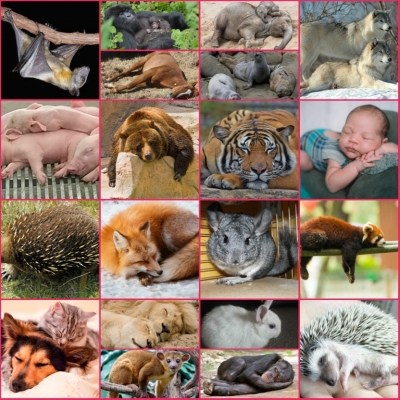
SLEEP
Animals sleep to save energy, rest their muscles, and allow their brains to process the information that they pick up while awake. Some hunting animals sleep a lot, because they devote only a few hours each day to looking for food. Animals that are hunted spend much more of their time awake and alert.
- Bats sleep for about 20 hours a day, often in large colonies.
- Two-toed sloths are awake for only four hours a day. Like bats, they can cling to branches with their claws while fast asleep.
- Gorillas like to have about 12 hours of sleep a day.
- Horses need just three hours of sleep a day.
- Elephants stand up for two of the four hours a day they sleep. They have to lie down for the dreaming stage, when their muscles are too relaxed for them to stay on their feet. Large plant-eating animals tend to get less sleep than smaller animals, because they have to spend so much time looking for food and eating.
- Seals often sleep on rocks and beaches, but they can also sleep floating upright at sea, or even underwater, surfacing to breathe without waking up.
- Wolves may sleep for up to 14 hours a day, especially if they have had a big meal after a successful hunt.
- Pigs need eight hours of sleep a day, just like adult humans.
- Bears also clock up about eight hours of sleep a day.
- Tigers sleep for up to 16 hours, since they can catch all the food they need within a very short time.
- Sheep are descended from wild animals that needed to stay awake to escape predators, so they sleep for less than four hours a day.
- Kinkajous are raccoon-like animals that forage for food at night, and sleep all day for about 12 hours.
- Armadillos sleep for 18 hours a day, curled up in their burrows.
- Human babies need 15 hours of sleep a day. We sleep less as we get older, so adults sleep for an average of eight hours, and elderly people for less than six hours.
- Echidnas are egg-laying mammals that sleep for about 14 hours a day. Scientists believe they do not have phases of dream sleep like other mammals.
- Red foxes sleep for about 10 hours, mostly during the day. Like many hunters they are more active at night when they track their prey using their sensitive noses and ears.
- Koalas eat tough eucalyptus leaves that are hard to digest and provide little energy, so they spend about 15 hours a day sleeping and another five hours dozing.
- Dogs sleep for 10 hours a day.
- Red pandas, which are like bamboo-eating raccoons, sleep for about 11 hours a day.
- Cats often sleep for 15 hours a day. Wild cats are most active during the night.
- Lions sleep for at least 13 hours. While they sleep, other animals feed near them without risking attack.
- Chinchillas sleep in burrows for about 13 hours a day, high in the mountains of South America.
- Rabbits sleep for about eight hours, mainly during the day. They prefer to feed at night when they are not so vulnerable to predators.
- Chimpanzees normally sleep for 10 hours a day, but baby chimps sleep for longer.
- Baby gorillas need more sleep than their parents, and may sleep or doze for more than 15 hours.
- Hedgehogs usually sleep for 10 hours during the day. In winter, they hibernate (spend the cold months in a sleep-like, inactive state).
Picture Credit : Google




